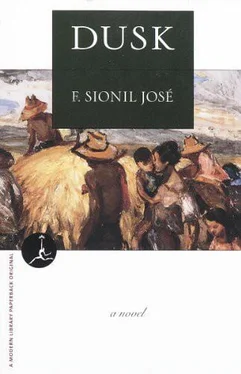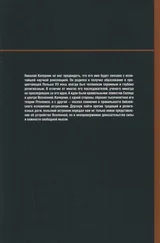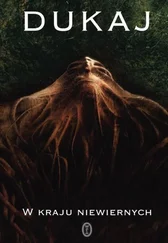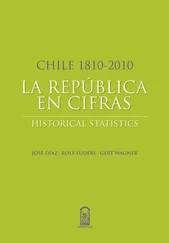The boys were busy with their food; Antonio, who was older, however, would turn to his father often, as if he shared his mother’s inquisitiveness.
“There is a new lamp in the big house,” Istak said. “It has a large wick and is fed by a different kind of oil. It is very bright, ten times brighter than candles and our own lamp.”
This was not what Dalin wanted to know.
“He is a kindly man,” Istak finally said. With his hand he shaped a ball of rice and then dipped it in a dish with fish sauce and sliced lemon. “He is ill — and I will see him again tomorrow. And yon know, Old Woman, he wants me to have breakfast with him. This farmer Istak, having breakfast with such a noble person. I cannot believe it.”
Dalin smiled, pleased at the honor given her husband.
Istak seldom had Po-on on his mind now; still, there were instances out there in the soggy fields when he remembered. Memories no longer wrenched from him the ancient sorrow. His granary was always full, the bangcag and the guardian that watched over it had been kind, too; the bamboo thrived, the orange trees bore sweet fruit, vegetables grew even during the dry season — all he shared with relatives and neighbors who were too lazy to plant. He was a good provider; he was a better teacher.
Night came swiftly to Cabugawan. After supper, Dalin cleared the low eating table, then leaned it against the palm-leaf wall. She placed the leftovers into a coconut shell which Pedro, the younger boy, took below the house for his dog, Lightning. Dalin drew up the bamboo ladder.
The two boys slept in the kitchen while Dalin and Istak slept in the small sipi which adjoined the living room. Below the house were the plows and the harrow, a couple of hoes, and the loom Dalin used for weaving.
The small window would stay open till they were ready to sleep. Dalin had closed the other windows and slung a pole across them so that they could not be opened from the outside. The two carabaos and a calf were in their corral by the granary; there had been some cattle rustling in Carmay and Sipnget, but none so far in Cabugawan. Any stranger wandering in the neighborhood would be announced by the barking of dogs. One rainy night, a howling roused Dalin from sleep. She gripped the arm of her husband, who was then wide awake, too. He crept to a crack in the buri wall and peered outside to see shadows moving toward the corral. He opened the small window slowly. He kept a basket of stones ready for such a time. He started pitching with all his strength at the forms in the dark. Thuds, a scream of pain, men rushing, and soon the shouts of neighbors who had also been wakened. Not one of the carabaos in the village was taken. How would it be if the rustlers had guns? So much uncertainty and violence threatened them now, and those who plundered the countryside often did so in the name of the revolution.
Again, the thought came swiftly — if only he and his family could flee to some deeper forest where they could clear and work the land without being badgered by other men. This was what so many had done — the fugitives from Spanish forced labor and the lash, the mal vivir , who had challenged the wilderness or sought community with the mountain peoples — the Aetas, the Balogas, the Bagos — and became one with them. He could do this with confidence born out of the sweat, the agony of having tried. He knew how to pit his intelligence against animals, even against some of nature’s whims. In fact, nature was no enemy but a friend. There was tight kinship here, all his neighbors shared with him this beginning. Would they all be driven away again and be estranged from one another? Everywhere there was no peace such as he might have found had he become a priest. And again, old Padre Jose came to mind.
Time had dulled Istak’s earlier enthusiasms, and even his preoccupation with faith and liturgy now seemed a precious memory. How was it ever possible for him to believe in the seeming omnipotence of prayer? Of Padre Jose’s missionary courage? Did he delude himself in believing completely what he had learned in the sacristy? It was what he learned from there, after all, which had made him what he was. Would it have been better if he had had the open mind to accept all there was to accept, even the unexplainable such as those things which he witnessed? There were those aspects of living that need not be questioned anymore, the futility of it all, the dying, this night that covered the land, those distant stars that Galileo was troubled about.
In the kitchen, one of the boys was already snoring. Beside Istak, the softness of Dalin. Lifting the rough blanket which covered her, his hand slid up from her smooth, flat belly to her breasts. They were firm still in spite of two breastfed babies. She turned onto her side, breathing on his face, and laid an arm around his chest. Outside, in the corral the calf was mooing and a night breeze stirred in the bamboo grove beyond the house. The air smelled of harvest, of the good earth.
“I wonder what he wants,” Istak said softly.
“It is an honor,” Dalin said, “when someone like him needs you. It could be dangerous, too.”
“He told me that.” He quickly remembered.
“And we are small people, Old Man,” she reminded him.
Istak did not speak. Long ago he had learned how to live with his smallness. This woman beside him made him strong, his fate more bearable.
In the morning, at her urging, he had a breakfast of coffee, fried rice, and roasted dried venison. Dalin told him he would be uncomfortable before the Cripple; he would be so self-conscious of his manners that he would not be able to take two mouthfuls.
Don Jacinto met him in the wide sala . The sun was already up, yet the house seemed dark but for the shine of the hardwood floor and the mirrors on the walls.
“Apolinario is really impressed, Eustaquio,” the cabeza said, beaming. “And I did not know you could speak Latin.” He slapped Istak affectionately on the shoulder.
He was ushered into the room of the guest. The Cripple was not there; he had been transported to the nearby azotea , which was now flooded with the morning sun, brilliant on the potted palmettos, on the red tile floor.
The Cripple was still pale. Beads of perspiration clung to his brow. The cook came with their breakfast in trays and Don Jacinto left them. The Cripple’s food — upon Istak’s order — was now almost without salt, and he grimaced as he ate the broiled fish and fried rice.
“As you can see, Eustaquio,” he said, “I am a very good patient.” He took the glass of light brown liquid and drank all of it.
“I feel better,” he continued. “And my urine, it was clearer this morning. I drank four glasses last night.”
The Cripple turned and picked up two lead pencils and a beautiful new notebook beside the food tray. “I hear you don’t accept payment — so take these. You are a teacher. You need them.”
As Dalin had said, Istak had difficulty eating even with the Cripple’s continued urging. He had never used table napkins before or the silver that the Cripple was using, although he had seen them in the sacristy.
“It is your kidneys, I suspect, Apo,” Istak said. “They are probably not working well and what you are drinking merely helps clean them. I am not sure it can do everything if the damage is serious. I am not a doctor, Apo.”
“In the absence of one, you are heaven-sent,” the Cripple said. “And since you are my doctor now, I will tell you frankly what I fear.” The Cripple beckoned to him to come close so that he could listen better. Now his voice became softer, as if revealing a horrendous secret. “You must keep this to yourself. Will you promise that, Eustaquio?”
Читать дальше












